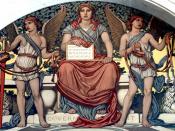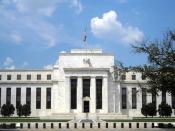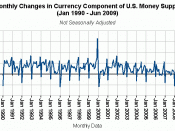Notes on Economic Video
Recession - inadequate demand. (Not enough people buying)
What Causes recession?
Times when inflation starts to occur. (When prices are rising, getting out of control.) The government tries to combat this by making money scarce and by raising taxes and by cutting government spreading.
Fiscal policy vs. monetary policy:
There are 2 main ways the government has to improve the economy.
Fiscal Policy:
Occurs when the administrative and congress are involved and has to do with spending and taxing.
Monetary Policy
Is under the control of our central bank (our federal resource). Monetary policy involves changing interest notes and changing the amount of money the commercial banks have to lend. (money supply.)
To control inflation
Federal Reserve raises interest rates making borrowing more expensive, than people have less to append - buying power and barrowing power go down,)
To correct a recession
Federal Reserve lowers interest notes.
As people's buying and borrowing power improves people will go out and make more purchases.
There are two main schools of economic thought in the United States today. (Keynes vs. Friedman.)
Keynesian philosophy says there is inadequate demand on not enough purchasing power in the in the economy. He asserted increased government spending can solve the problem. President Roosevelt tried to put Keynesian philosophy into practice in his New Deal. He had the government spend more on various work programs.
Keynes said - In bad times - government should spend more and tax less. Such will increase demands. Keynesian philosophy is associated with a strong central government , Democrats and liberals.
VS.
Monetary Policy associated with Milton Friedman, deals with the Federal Reserve., money supply and interest rates. Monetary policy -says the economy is stale. Only actions taken by the government tend to destabilize it. Thus, monetary policy...


